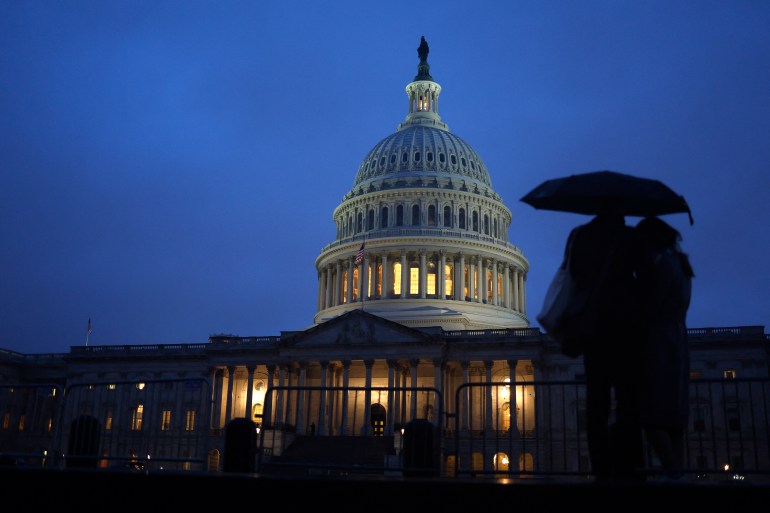A number of scientists, politicians and advocates have condemned the passage of a bill by the US Senate this week foreign financing bill This would provide billions of dollars in military aid to Ukraine, Israel and Taiwan, while American social programs require funding.
It is unclear when — or even if — the House will vote on the measure, which includes $9 billion in international humanitarian aid, some of which could go to besieged Palestinians in Gaza.
But analysts say the Senate’s passage of the $95 billion emergency relief package on Tuesday by a 70-29 majority reflected Capitol Hill’s longstanding prioritization of guns over needs for housing, health care, education and debt relief brought.
Lindsay Koshgarian, program director of the National Priorities Project at the Institute for Policy Studies, told Al Jazeera that she has “extreme concerns” about the overall scope of the Senate legislation.
“At $95 billion, this is a significant increase in the U.S. federal budget and a significant commitment of resources to war,” she said.
“There are huge discrepancies about where resources are going.”
On social media this week, some observers also criticized the foreign aid law, citing a lyric from the late rapper Tupac Shakur: “Got money for war but can’t feed the poor.”
“Distorted priorities”
The Senate bill (PDF) provides, among other things, $60 billion in military and economic aid to Ukraine and $14.1 billion in security assistance to Israel.
Critics of the law say that spending money on ammunition is tantamount to “throwing good money after bad.” House Speaker Mike Johnson has indicated he will not allow the relief package to reach the House floor for a vote because he had called for immigration reform as part of the legislative package.
Since the administration of former President Lyndon B. Johnson escalated the war in Vietnam and derailed the War on Poverty program in the 1960s, the federal government has increasingly cut social spending while allocating ever larger portions of its overall budget to militarized programs.
Accordingly a May report According to the National Priorities Project, 62 percent of the federal budget — $1.1 trillion — went to these programs in fiscal year 2023.
In contrast, “less than $2 in every $5 of federal discretionary spending was available to finance investments in people and communities,” including public education, housing and child care, and other social programs.
“We must invest in humanity, both at home and abroad. “Congress must stop pouring taxpayer dollars into endless wars and invest in the housing, health, education and social programs our communities need,” Democratic Congresswoman Cori Bush tweeted Tuesday after the Senate bill passed.
We must invest in humanity, both at home and abroad. Congress must stop pouring taxpayer dollars into endless wars and invest in the housing, health, education and social programs our communities need. pic.twitter.com/3Fdy9cs4Sc
— Congresswoman Cori Bush (@RepCori) February 13, 2024
In particular, the Senate’s decision to give Israel more military aid as it continues to bomb Gaza has drawn widespread criticism and raised questions about priorities on Capitol Hill.
“In a situation where the International Court of Justice has said that it is plausible that genocide could occur [in Gaza]“The Senate’s decision to authorize the supply of $14 billion in weapons to Israel makes the U.S. a more direct accomplice,” said Mike Merryman-Lotze, Just Peace Global Policy Director at the American Friends Service Committee.
William Hartung, senior researcher at the Quincy Institute for Responsible Statecraft and an expert on U.S. military budgets, also said that in total, “$95 billion is a lot of money even by Washington standards.”
The passage of the Senate bill, Hartung wrote in Forbes on Wednesday “shows the federal government’s distorted priorities.”
“Despite deep disagreements, it is possible to get bipartisan support for a package that primarily includes financing arms exports. “Don’t expect such an emergency measure to address record levels of homelessness, help one in six American children living in poverty, or accelerate investments to mitigate the climate crisis,” he said.
An employment boost?
Biden has argued that the bipartisan legislation is critical to U.S. national security interests and sends a clear signal that his administration continues to stand with its allies. According to the president, the bill will also strengthen the US economy by creating jobs.
“While this bill sends military equipment to Ukraine, the money will be spent right here in the United States of America in places like Arizona, where the Patriot missiles are built; and Alabama, where the Javelin missiles are built; and Pennsylvania, Ohio and Texas, where artillery shells are manufactured,” Biden said in an address at the White House on Tuesday.
“Here’s how it works: We supply Ukraine with military equipment from our stockpiles and then spend our money to replenish those stockpiles so our military has access to them – stockpiles that are made right here in America by American workers.” , he said.
“Not only does this support American jobs and American communities, it also allows us to invest in maintaining and strengthening our own defense production capabilities.”
However, research has shown that other types of government spending would contribute more to job creation than what one researcher described (PDF) as Washington’s pattern of “feeding a wolf—the militarized economy—to the detriment of others.”
Heidi Peltier, senior researcher at the Watson Institute for International and Public Affairs at Brown University and program director of the Costs of War Project, wrote in a June report that military spending supports 6.1 jobs per million dollars spent.
By comparison, the report found that healthcare creates 11.6 jobs per $1 million – almost double – while a $1 million investment in primary and secondary education creates 21 jobs, that is more than three times as many. The same investments in wind and solar energy would also create nine to 14 percent more jobs.
Better Uses for $95 Billion
According to Koshgarian of the Institute for Policy Studies, there are a variety of ways $95 billion could be better used to support Americans, from funding programs to combat child poverty and education to addressing affordability issues Living room.
For example, she noted that a key federal nutrition program for women, infants and children — known as WIC — faces a $1 billion funding shortfall. “It’s an incredibly important program, many families rely on it,” she said. “A billion dollars to make up the deficit would be easy to raise.”
The US is also falling short of its goals for climate adaptability and a green economy, Koshgarian told Al Jazeera, and the public is “continually told that we do not have the resources to fully pay for these programs”.
Greater investment in programs like these, she added, “will pay off for the people of this country in many ways in the long run, similar to investments in wars abroad.” [doesn’t]“.
“When the US invests in war elsewhere, it only perpetuates these instabilities, and it is not a cycle that can be ended by investing in militarism over and over again.”

Merryman-Lotze of the American Friends Service Committee also said $95 billion could be better spent on domestic priorities like the environment and education.
And if the U.S. really wants to address the causes of conflict abroad, it could do better than spending money on weapons, he added.
“The U.S. approach to conflict and problems is highly militarized, whether it is the way we respond to crime at home through policing and prisons, or the way we respond to conflict abroad through the use of military force,” Merryman-Lotze said AlJazeera.
“The first thing we turn to in most cases is the military, the police, violence and weapons. This is how our system has been built over decades, and we need to move away from this reliance on the idea that violence is the way to achieve security.”






Recent Comments